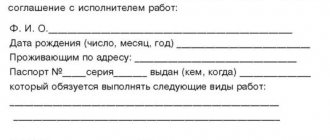How to issue a refusal
Review of a letter does not in any way guarantee that the representative of the organization who received it will necessarily agree to the proposal, request or claim contained in it. On the contrary, in many cases, company employees write refusals.
But in order to refuse correctly, you need certain skills. It is important not to offend the sender of the letter with negative content - this is dictated not only by the rules of basic business politeness, but also by the possibility that in the future he may become a customer, client or partner.
Possible difficulties when writing a refusal and how to overcome them
When drawing up a refusal, difficulties often arise, which may be associated with the following nuances:
- the need to maintain the recipient’s loyalty, since it is planned to interact with him in the future as a partner or client;
- the importance of avoiding offense associated with the negative content of the letter;
- the inability to meet the addressee halfway due to objective reasons;
- psychological difficulties (the author finds it unpleasant to refuse in principle).
To overcome the difficulties that have arisen, you need to understand that refusal is a normal working practice and an ordinary case for any business. Of course, it is impossible to respond to all commercial offers and accept all invitations. The main thing is to refuse as correctly as possible, and business correspondence skills can help in solving this problem.
General information about business letters
All official correspondence is subject to certain drafting rules. First of all, it is necessary to remember that, despite the fact that the content of the letter can be absolutely arbitrary, its structure and composition must comply with the standards adopted in the preparation of business papers, i.e. conditionally divided into three parts: the beginning (appeal and title of the letter), the main section and the conclusion (signature and date).
The writing style should be restrained, concise, without overly “loaded” sentences or complex specific terminology. The refusal should be made as correct as possible; rudeness, profanity and other extreme manifestations are unacceptable. When forming a letter, it is necessary to take into account the norms of the Russian language in terms of speech culture, vocabulary, grammar, spelling and style.
The refusal may be unmotivated, but it is still better if the reason is indicated in the letter.
If the answer is detailed and thorough, then you should divide it into paragraphs or points - this will make the perception of the text much easier.
If you refuse, there is no need to cut back and “burn bridges”; it is advisable to leave a path to retreat, that is, to thank for the attention shown and express hope for the possibility of further cooperation. To do this, you can specify the conditions that the recipient must meet to establish a business relationship. If there is an opportunity to recommend a company that would also agree to cooperation or other proposals made in the initial message, then you should not neglect it - this will leave a good mark in the memory of the addressee.
Recommendations for writing refusal letters
1. In order to write rejection letters competently and effectively, you must have a calm internal business mindset. I voice it to the participants of my training like this: “You work in business. Business is a sphere of interaction where each party pursues its own goals. The goals of the parties do not always coincide. It is important to adhere to mutual respect and understanding that everyone has the right to their own interests. You represent the business interests of your company. The case of failure is an absolutely normal case for any business. Moreover, this is a working practice that you need to learn to work with competently. Learning to refuse competently means learning to do it as correctly as possible.”
2. In order for the refusal to sound as correct as possible to the recipient, it is important that the letter contains the following important components:
1) the refusal letter must be personally addressed (personal appeal):
“Hello, dear Ivan Ivanovich!”
“Dear Natalya Konstantinovna!”
2) the refusal letter must contain gratitude for your response to our proposal:
“Thank you for the opportunity you have found by providing us with your business proposal!”
“Thank you for responding to our proposal”
“Thank you for sending your resume to our address.”
3. The refusal letter must contain information indicating that the addressee's proposal/commercial proposal/resume has been carefully studied (the refusal letter must contain facts and words recognizable to the addressee).
“We have reviewed your company’s project to organize... for our
“We have carefully studied the information about your professional experience and knowledge.”
4. The refusal letter must contain positive assessments of the addressee (his proposals, products, experience, etc.) and any options for praise/compliment regarding the offer with which the addressee contacted us:
“The scheme you proposed was very interesting for us...”
“Your engineering solution is worthy of respect and is highly appreciated by our specialists”
“Your experience deserves attention and respect...”
5. The refusal letter must contain a clear wording of the refusal + a clear explanation of the reasons why the decision was made to refuse:
“Despite the technically competent project, we are forced to refuse your services for now. Since the costs that our company will be forced to bear, both during the payback period of the project and after, exceed our current costs."
“At the same time, we have decided that it is impossible to accept your proposal at the moment. This is due to the fact that...”
“Unfortunately, at the moment we have made a positive decision in favor of another candidate, whose professional experience is more consistent with the scope and complexity of the tasks being solved in this position.”
6. The letter should include a suggestion (or just a mention) of possible alternatives:
“We hope that in the future we will be able to return to this project and continue cooperation”
“We are confident in the possibility of cooperation in the implementation of future projects”
“We are ready to consider your candidacy when new vacancies open.”
Now look at how a refusal letter generally sounds using the components listed above:
Letter of refusal
Correctness Tools
Drawing up a refusal letter
The letter can be written by hand (this format will indicate a special, warm attitude towards the addressee) or printed on a computer.
In this case, it is acceptable to use a simple sheet of paper or a form with company details and a company logo.
The letter of refusal is generated in a single original copy and must be dated and numbered (in accordance with the document flow of the enterprise). In this case, information about it should be included in the journal of outgoing correspondence, noting its date, number and briefly its contents. In the future, this log can become evidence of the creation and sending of a message.
How to send a letter
A letter can be sent in different ways, but it is best to choose the one through which the original message was sent. The most acceptable way is to send it via Russian Post, but in this case you should take it registered with acknowledgment of delivery; you can also use delivery through a representative or courier (this method guarantees faster delivery). It is also acceptable to use fax, electronic means of communication, and even social networks or instant messengers (but only on the condition that the sender of the initial letter himself uses this method of communication).
Letter of refusal to cooperate
If you need to create a letter of refusal to cooperate, look at its sample and comments to it.
- At the beginning of the letter, write who it is intended for: indicate the name of the organization, position and full name of its representative, to whose name you are writing a response. Use a polite form of address, thank for the attention shown to your company and then move on to the essence of the message.
- Be sure to refer to the letter in response to which you are writing a refusal, and indicate the circumstances that caused the negative reaction. If your opponent attached any additional papers to his proposal, indicate that you have read them.
- If possible, express in your letter an expression of hope that cooperation will take place, without failing to include the conditions that must be met for this to happen.
- Finally, sign the letter and date it.
Download examples and forms of refusal letters:
Letter of refusal to cooperate
Please indicate the exact addressee of the letter. If this is an official of an organization, then its name must also be mentioned. Using a polite form of address, you must thank the author for the proposal made.
The body of your message should refer to the original letter and briefly but clearly state the reasons for the refusal. If the proposal contained supporting documents, then show that you have read them all.
It is highly desirable to express the hope that future cooperation may still take place and indicate the conditions the fulfillment of which will make this possible. Sign and date the letter. And don’t forget to register it in the outgoing correspondence journal.
Here is a sample (in all subsequent examples, the parts with details and signatures are not shown, since they should not cause any difficulties):
Letter of refusal to participate in the event
This letter, in fact, is practically no different from the previous one and consists of the same parts:
- appeal;
- thanks for the offer;
- mentioning the topic of the sentence;
- reasons for refusal;
- expressing the possibility of further cooperation;
- signature;
- date of;
- internal outgoing registration number.
All this can be seen from the example:
Letter of refusal if you disagree with it
This is perhaps the most difficult case. In general, it’s unpleasant to refuse, and if you don’t agree with him... This was a candidate chosen specifically by you. You really liked this supplier. You never know. And when a senior manager decides to refuse, the temptation arises to hide behind his back. This can be done using the approximate wording “Our management has decided to refuse...”. But this is the wrong way to go and makes your organization look bad, making it look like a frivolous institution. In addition, this approach also undermines your authority as a decision maker.
Therefore, always use the pronoun “we” rather than “they”, and the best wording would be something like: “After much discussion, we have decided to abandon...”.
Letter – refusal if the idea doesn’t work
This is also a complex version of such a letter. You feel sorry for the time you wasted on work. You tried in vain and for a long time to implement the project, to make the idea work. Your external colleague is probably aware of the problems and difficulties that have arisen, so the letter itself may be terse. For example:
By the way, in this particular case, a simple phone call may be enough.
Letter of refusal to grant leave
Sometimes the manager has to write such refusals. All writing rules are preserved. Particular attention should be paid to the wording of the importance of the applicant’s contribution to the common cause and his indispensability. It should be emphasized that leave will be granted as soon as the circumstances preventing it disappear.
Letter of refusal to provide a job
And here you need to emphasize your interest in the candidate, your readiness to provide him with a job in the future, despite the current refusal
Letter of refusal of a job offer
Sometimes there are letters like this. An applicant for any position may refuse it. A well-known specialist in his circles is even more likely to refuse if he has received an offer to fill a vacant position from some little-known enterprise. But even in this case, it is necessary to follow all the rules of business etiquette - from the tone of the letter to the signature. Indicate the name of the position, the reasons for the refusal and remember that the potential employer can change the proposed terms of the employment contract for the better for you.
We looked at general writing rules and several examples of rejection letters. The ability to write such messages is an integral part of the business skills of any successful entrepreneur or company employee holding a more or less management position.
All that remains is to wish that you need these skills as rarely as possible.
Letter of refusal to participate in the event
When writing a letter of refusal to participate in an event, use the guidelines above for a letter of refusal to cooperate. Everything in the letter is standard, but mandatory: information about the sender and addressee, then the appeal, the refusal itself with a mention of the received proposal to participate in the event and an obligatory indication of the circumstances that served as the reason for the negative response, then the signature and date.
How to draw up a sample refusal to sign an agreement (example)
Below we provide a letter of refusal to sign an agreement, which can be modified to suit a specific situation.
| Good afternoon, Vladimir! | Personal targeting |
| Thank you for the opportunity you have found by providing us with a business proposal! | Thanks for your response to the proposal |
| We have reviewed your company's project to organize office printing for our company. | An indication that the addressee's proposal has been carefully studied |
| The scheme you proposed was very interesting for us, but the costs that our company will be forced to bear, both during the payback period of the project and after, exceed our current costs. The costs of the risks that your project eliminates are currently less than the costs of the project. | An indication that the addressee's proposal has been carefully studied. |
Letter of refusal of a job offer
Not only the company can receive a letter of refusal. In some cases, it can be expressed by a person who has nothing to do with the company: for example, an applicant for a position. If you are such a person, formulate the refusal also in accordance with the rules and regulations of business documentation. Use polite language, indicate the name of the job offered to you, as well as the reason why you are refusing it (do not forget that the potential employer may reconsider the terms of the job offered to you). At the end, be sure to sign and date it.
Refusal to sign a contract for the supply of goods for state and municipal needs
The customer of the goods has the right to refuse to sign a contract with the person who won the auction. The reasons for this are given in paragraphs. 9 and 10 art. 31 Federal Law No. 44.
In particular, the right of refusal is provided if:
- A participant in procurement activities does not meet the requirements for such persons.
- The participant provided information that is not true, and in fact he does not meet the established requirements.
- There are circumstances provided for in paragraph 10 of Art. 31 Federal Law No. 44, which relates to the purchase of medicines.
In other cases, the customer has no right to refuse.
The procedure for refusal (if there are grounds for this) is as follows. On the day the grounds for refusal are discovered, or the next day, the customer publishes a protocol of refusal on the Internet and sends it to the participant within 2 days.
The document contains various data, including:
- about where and when it was issued;
- about the details of the performer;
- about the details of the contract;
- about the reason for refusal.
If the procurement participant refuses the contract, the security payment is withheld.
How to write a refusal letter correctly - we teach with an example
Today we will talk about a not very pleasant, but quite common situation - a letter of refusal. Refusal occurs in a wide variety of business situations: refusal to continue/renew cooperation, refusal to fulfill requirements, refusal to hire, etc.
Despite all the different business situations, writing a refusal letter is associated with the same difficulties when:
- we cannot meet our addressee halfway (perhaps the addressee is “not bad”, but does not suit us for a number of objective reasons);
- it is unpleasant for us to refuse;
- It is important for us (personally or as a company) to maintain the goodwill and loyalty of the recipient.
I recently conducted business writing training for a large manufacturing company. The training participants were heads of departments that ensure the efficient operation of the procurement service. Due to their line of work, they often have to write refusal letters. For example, a company announced a competition (tender) to select a supplier of services or raw materials or production materials. She received applications from potential participants. The tender committee selected one or more companies for cooperation. Some companies were not selected. And in this situation, you need to formally and politely write a letter of refusal. It would seem that what is so difficult here? Take it and write: “As a result of consideration of your application, a decision has been made to refuse your cooperation.”
And this is where the difficulty arises: if you imagine yourself in the place of the addressee receiving such a letter, then for most people this formulation sounds somehow not very good and even offensive, although in fact there are no bad words here. But there are negative emotions, there is a feeling of resentment that the proposal was not appreciated, that they did not choose, that preference was given to another. And the authors of the letter are in danger of not receiving a response to their proposals in the future.
How to correctly refuse a commercial proposal orally: options, examples
Refusal in any case is unpleasant. However, refusal of a commercial case, business alliance or business is something that occurs frequently. Refusal has the right to exist in various situations:
- You can refuse irrelevant offers
- Don't agree to cooperate
- Refuse demands
- Refuse to do a certain amount of work
- Refusal to hire
Saying “no” to someone is, of course, unpleasant, but in some cases it is simply necessary. For a respected boss or administration, it is important to choose really “strong” and intelligible words, because sometimes the banal “we are not interested in this” can sound quite rude. Thus, a potential or actual client will feel offended and disappointed, which will scare him away from coming to the organization, establishment, institution again.
There are a number of “universal” words and cliché phrases that a professional negotiator needs to use in order to refuse correctly.
It is important to remember the rules:
- Under no circumstances should you get personal, as you may offend a person completely unreasonably.
- Make it clear to the person that you are not refusing him as a person, but that you do not completely agree with his proposals.
- If you have the opportunity, offer the client a completely different, more useful cooperation.
- After or before refusal, give the person a significant and significant compliment about his work, abilities, and capabilities.
- Be sure to justify your refusal in such a way that the person understands you.
- Use reflective phrases, for example: I thought it over, I reasoned it out, I weighed the pros and cons, I thought about all the details, and so on.
- Don't forget to thank the person for doing a certain job for you.
- Apologize for the inconvenience or the circumstances.
How to refuse and say no?










